Related Research Articles
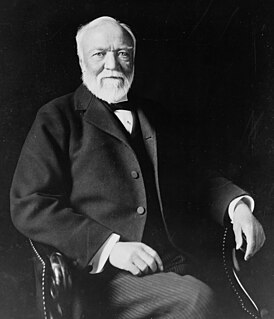
Andrew Carnegie was a Scottish-American industrialist and philanthropist. Carnegie led the expansion of the American steel industry in the late 19th century and became one of the richest Americans in history. He became a leading philanthropist in the United States and in the British Empire. During the last 18 years of his life, he gave away ~$350 million to charities, foundations, and universities – almost 90 percent of his fortune. His 1889 article proclaiming "The Gospel of Wealth" called on the rich to use their wealth to improve society, and stimulated a wave of philanthropy.

The Gospel according to John is the fourth of the four canonical gospels. It contains a highly schematic account of the ministry of Jesus, with seven "signs" culminating in the raising of Lazarus and seven "I am" discourses culminating in Thomas's proclamation of the risen Jesus as "my Lord and my God"; the concluding verses set out its purpose, "that you may believe that Jesus is the Christ, the Son of God, and that believing you may have life in his name."

Gospel originally meant the Christian message, but in the 2nd century it came to be used also for the books in which the message was set out; in this sense a gospel can be defined as a loose-knit, episodic narrative of the words and deeds of Jesus of Nazareth, culminating in his trial and death and concluding with various reports of his post-resurrection appearances. The four canonical gospels of Matthew, Mark, Luke and John share the same basic outline: Jesus begins his public ministry in conjunction with that of John the Baptist, calls disciples, teaches and heals and confronts the Pharisees, dies on the cross, and is raised from the dead. Each has its own distinctive understanding of Jesus and his divine role: Mark never calls him "God", Luke follows Mark's plot more faithfully than does Matthew but expands on him while eliminating some passages entirely, and John, the most overtly theological, is the first to make Christological judgements outside the context of the narrative of Jesus's life. They contain details which are irreconcilable, and attempts to harmonize them would be disruptive to their distinct theological messages.

John the Apostle was one of the Twelve Apostles of Jesus according to the New Testament. Generally listed as the youngest apostle, he was the son of Zebedee and Salome. His brother was James, who was another of the Twelve Apostles. The Church Fathers identify him as John the Evangelist, John of Patmos, John the Elder and the Beloved Disciple, and testify that he outlived the remaining apostles and that he was the only one to die of natural causes. The traditions of most Christian denominations have held that John the Apostle is the author of several books of the New Testament.

The Gospel According to St. Matthew is a 1964 Italian biblical drama film in the neorealist style, written and directed by Pier Paolo Pasolini. It is a cinematic rendition of the story of Jesus according to the Gospel of Matthew, from the Nativity through the Resurrection. The dialogue is taken directly from the Gospel of Matthew, as Pasolini felt that "images could never reach the poetic heights of the text." He reportedly chose Matthew's Gospel over the others because he had decided that "John was too mystical, Mark too vulgar, and Luke too sentimental."
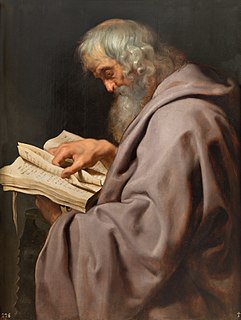
Simon the Zealot or Simon the Canaanite or Simon the Canaanean was one of the most obscure among the apostles of Jesus. A few pseudepigraphical writings were connected to him, but Saint Jerome does not include him in De viris illustribus written between 392–393 AD.

"Wealth", more commonly known as "The Gospel of Wealth", is an article written by Andrew Carnegie in June of 1889 that describes the responsibility of philanthropy by the new upper class of self-made rich. The article was published in the North American Review, an opinion magazine for America's establishment. It was later published as "The Gospel of Wealth" in the Pall Mall Gazette.

In Christian tradition, the Four Evangelists are Matthew, Mark, Luke, and John, the authors attributed with the creation of the four Gospel accounts in the New Testament that bear the following titles: Gospel according to Matthew; Gospel according to Mark; Gospel according to Luke and Gospel according to John.
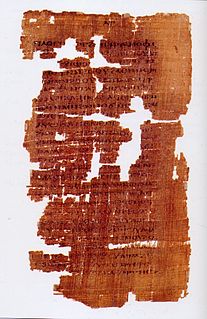
The New Testament apocrypha are a number of writings by early Christians that give accounts of Jesus and his teachings, the nature of God, or the teachings of his apostles and of their lives. Some of these writings have been cited as scripture by early Christians, but since the fifth century a widespread consensus has emerged limiting the New Testament to the 27 books of the modern canon. Roman Catholic, Eastern Orthodox and Protestant churches generally do not view these New Testament apocrypha as part of the Bible.
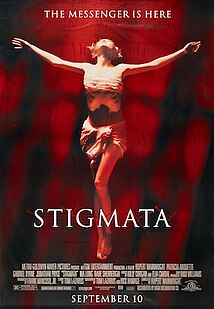
Stigmata is a 1999 American supernatural horror film directed by Rupert Wainwright and distributed by Metro-Goldwyn-Mayer. It was written by Tom Lazarus and Rick Ramage. Its story follows an atheist hairdresser from Pittsburgh, Pennsylvania, who is afflicted with stigmata after acquiring a rosary formerly owned by a deceased Italian priest who himself had suffered from the phenomenon. It stars Patricia Arquette, Gabriel Byrne, Jonathan Pryce, Nia Long, and Rade Šerbedžija.
Hyper-Calvinism is a branch of Protestant theology that denies the universal duty of human beings to believe in Christ for the salvation of their souls. It is at times regarded as a variation of Calvinism, but critics emphasize its differences from traditional Calvinistic beliefs.

The Gospel of Mary is a book considered non-canonical in Christian orthodoxy discovered in 1896 in a 5th-century papyrus codex written in Sahidic Coptic. This Berlin Codex was purchased in Cairo by German diplomat Carl Reinhardt.

Andrew Fuller was an English Particular Baptist minister and theologian. Known as a promoter of missionary work, he also took part in theological controversy.

Donald Andrew "Donnie" McClurkin, Jr. is an American gospel singer and minister. He has won three Grammy Awards, ten Stellar Awards, two BET Awards, two Soul Train Awards, one Dove Award and one NAACP Image Awards. He is one of the top selling gospel artists, selling over 10 million albums worldwide. Variety dubbed McClurkin as a "Reigning King of Urban Gospel".
The Covenant Awards are awarded annually by GMA Canada. The association is a non-profit organization whose mission is to promote the growth and ministry of Christian music arts in Canada. To this end, GMA Canada presents the annual Covenant Awards, Canada's national awards for the Canadian Gospel Music industry. The ceremonies are held annually in cities across Canada.

The commissioning of the Twelve Apostles is an episode in the ministry of Jesus that appears in all three Synoptic Gospels: Matthew 10:1–4, Mark 3:13–19 and Luke 6:12–16. It relates the initial selection of the Twelve Apostles among the disciples of Jesus.

The calling of the disciples is a key episode in the life of Jesus in the New Testament. It appears in Matthew 4:18–22, Mark 3:16-20 and Luke 5:1–11 on the Sea of Galilee. John 1:35–51 reports the first encounter with two of the disciples a little earlier in the presence of John the Baptist. Particularly in the Gospel of Mark, the beginning of the Ministry of Jesus and the call of the first disciples are inseparable.

In Christian theology and ecclesiology, apostles, particularly the Twelve Apostles, were the primary disciples of Jesus according to the New Testament. During the life and ministry of Jesus in the 1st century AD, the apostles were his closest followers and became the primary teachers of the gospel message of Jesus.
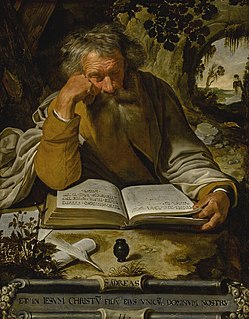
Andrew the Apostle, also called Saint Andrew, was an apostle of Jesus according to the New Testament. He is the brother of Saint Peter. He is referred to in the Orthodox tradition as the First-Called.

Saint Peter also known as Simon Peter, Simeon, Simon, Cephas, or Peter the Apostle, was one of the Twelve Apostles of Jesus Christ, and one of the first leaders of the early Church.
References
| | This article about New Testament apocrypha is a stub. You can help Wikipedia by expanding it. |